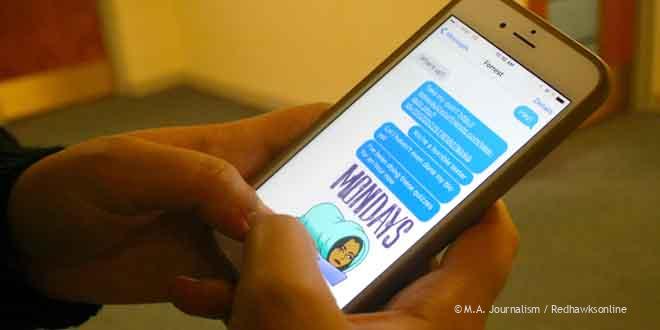Phone addiction is becoming more prominent in teens’ lives than they are willing to believe
“Recently, school has been really stressful for me,” said senior Luke Frazier. “So, one night, in order for me to actually get homework done, I turned my phone off, locked it in my car and even gave my mom the keys. I needed to be away from my phone and go work. I worked for three hours straight and got a ton of stuff done, but it’s sad that it got to the point where I had to lock my phone in my car and give the keys to someone so I wouldn’t use it.”
Phone addictions are a real disorder, and can lead to a future diagnosis of internet addiction. It might sound like a trivial problem now, but many people face these same issues and are moved to the point of seeking professional help.
Dr. Kimberly Young, founder of the Center for Internet Addiction, discovered that internet addiction is a diagnosable condition through her observation of a friend’s husband. He would spend $50 every hour to participate in online chat rooms. This type of addiction can lead to issues like loss of empathy, lower academic performance and a shorter attention span.
“I want to say no, but yes, I’m addicted,” Frazier laughed. “I guess the first step to solving a problem is admitting you have it, so yes, I’m addicted [to my phone]. I’ll get home early from practice, so I’ll have a lot of time to do homework and get stuff done. Then I’m on my phone, or on my laptop, or Snapchatting, or texting people and then I just keep putting my homework off. By the time I realize I have to start my homework, it’s the same time I would’ve started it if I had gotten home from practice regularly. I waste time on my phone.”
When homework is put off, students’ sleep schedules suffer. Logically, a lack of sleep will lead to lower performance academically. However, what Young emphasizes in a New York Times article is that, “Texting isn’t causing academic problems. I think it’s an attention-span issue.”
Nurse Heidi Streed elaborates, arguing that kids don’t feel the pressure to stretch their brain to the limits and actively remember important facts, because “everything is always ready at their fingertips on their phone.”
Along with a shorter attention span, major time spent with screens has been directly related to a loss of empathy. With more screen time, kids become used to communicating through thought out texted responses instead of learning how to read face-to-face social cues.
“I worry about the new habit forming potentials of screens and the way it can affect the brain development of my kids,” said philosophy teacher David Hoffner. “The loss of empathy in young people, the neurocircuitry in their brains where empathy is located, those connections are being severed. They don’t realize when someone is angry because so much of their social gauge has been mediated through technology instead of face-to-face [interaction].”
One of the key factors that fosters an addiction seems to be the usage of social media.
“I refrain from using social media because I see the way that it steals time from my peers,” said junior Elizabeth Cripe. She explains that she’s glad she doesn’t have to worry about issues like distractions, loss of sleep and lowered social cues.
David Townes, director of Catalyst Mental Health in uptown Minneapolis, explained that the demand for help with internet addiction is high-among boys.
“It’s almost entirely young adult boys who are requesting help from us,” he said. “I think there aren’t a lot of male therapists out there, so I started serving that population, because a lot of people were asking for it.”
While Townes expresses that boys are more likely to ask for help, multiple studies have shown that girls are more likely to foster compulsive addictions. According to the New York Times, researchers at the Pew Research Center found that from the 356 students they studied, girls were much more likely to become addicted. 12 percent of the girls (one in every eight) were found to be compulsive texters while only 3 percent of boys faced the same issue. The majority of the addicted teens sent more than 100 texts daily.
The society we live in today is one in which it is not easy to detach from electronic outlets, simply because the majority of daily life revolves around electronics.
“Everyone is using their phone, so it almost becomes an extension of yourself,” Frazier said. “You do so much on it, and so much of actual conversation and interaction with people has moved on to screens.”
Whether or not an individual feels “addicted” to their phone, Cripe advocates for a more disciplined relationship between humans and the devices they can’t seem to break away from.
“It’s the issue of being able to limit your time on it and limit your usage,” she said, “so that an interaction with people is not solely through a phone.”

